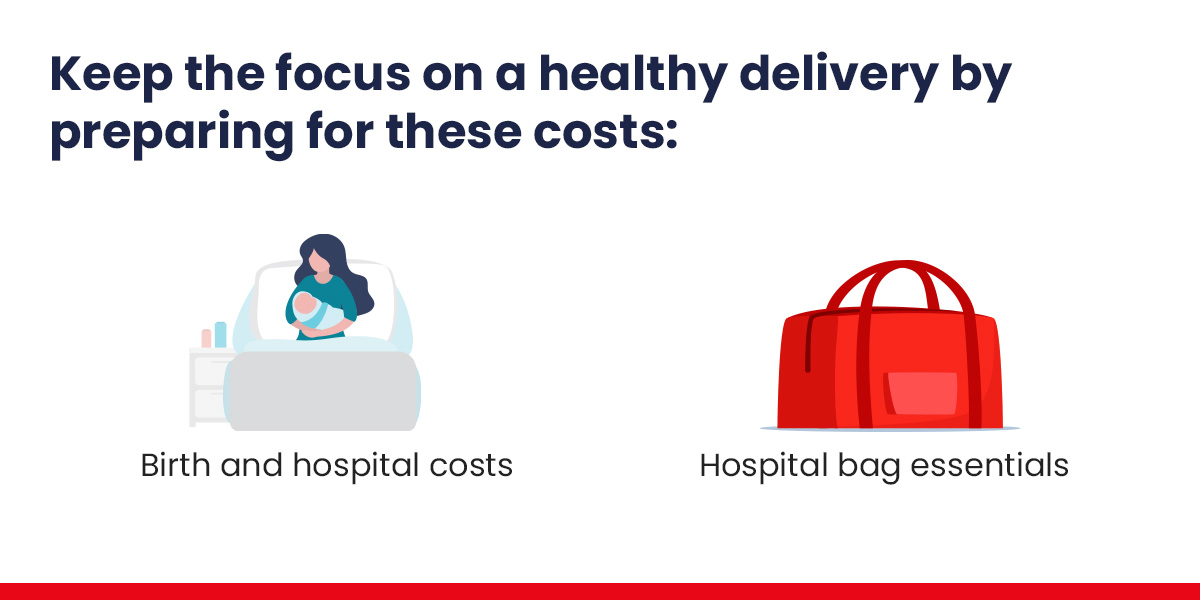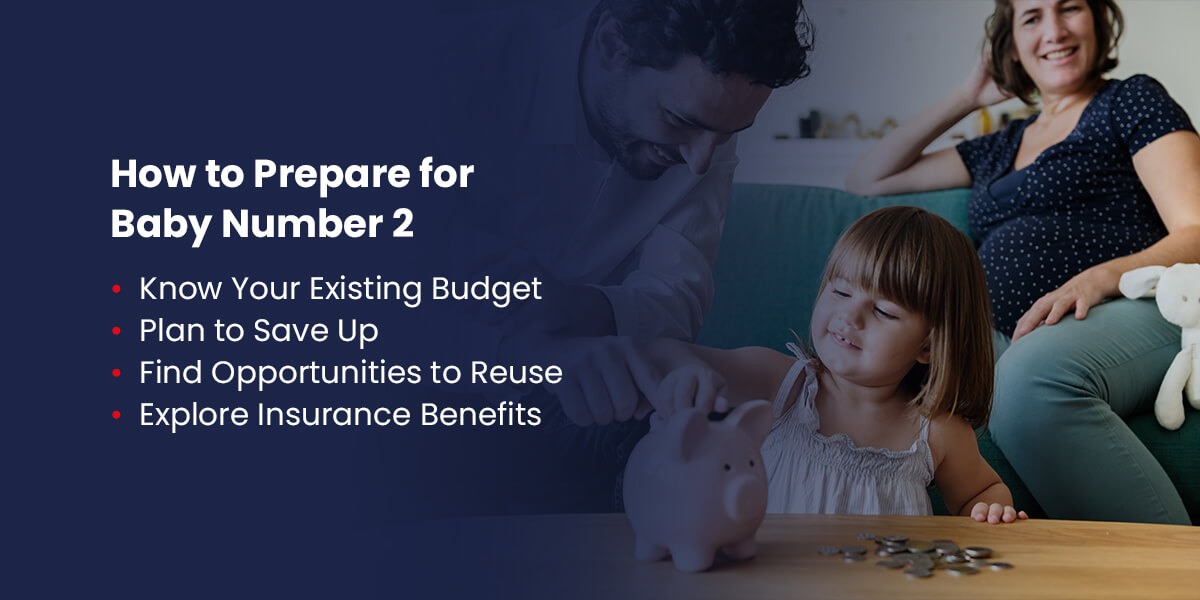
Finding out you are pregnant is one of the most exciting moments of your life, and your joy shouldn't be tempered by worry about your financial situation. With some savvy financial tips for having a baby, a little planning, and the wisdom and discipline to save, you can afford to bring this new life into the world!
If you are unsure where to start, it can help to think of planning for a baby financially as your first real parenting task. With the right insights, you can have peace of mind regarding your finances as you welcome home your little one.
Have a Pre- and Post-Delivery Budget
Budgeting is a powerful financial tool for managing your income and unexpected expenses, but drawing up a budget for welcoming a baby can understandably be overwhelming. One way to combat this and draw up a practical and helpful budget is to create separate financial plans for different stages. Breaking up your baby budget into smaller chunks makes it easier to look at what you need, when you need it, and how you can achieve it.
Pregnancy
Baby isn't here yet, but extra costs definitely come up when you're expecting. Budgeting for these essentials throughout your pregnancy will help you cover these additional expenses:
- Supplements: Your baby's health and well-being are your priority during pregnancy. Prenatal supplements give mom and baby the added vitamins and minerals needed for a healthy pregnancy. Folic acid is especially important in those early weeks.
- Maternity clothes: Growing a whole human being means lots of physical changes. Maternity clothes are essential for comfort and help moms look and feel their best during an exciting but often emotional time.
- Doctor's visits: It's vital to look at your health insurance to see exactly which appointments and procedures it covers so you can include out-of-pocket medical expenses in your budget.
- Prenatal classes: This one may not be necessary after your first child, but for first-time parents, prenatal classes are a must. Being equipped with professional advice and actionable knowledge can make a world of difference throughout pregnancy and especially childbirth.
- Nursery basics: Your baby's nursery needs to be ready long before they arrive. There won't be any time after the baby is born, so this is definitely an expense you should plan for during pregnancy. At minimum, you'll need a crib and bedding. You may also want to include a changing table, decor, and non-toxic paint in your nursery budget.
- Miscellaneous: If your baby budget allows for it, try to factor in extras such as pregnancy magazines, a baby shower, a babymoon, or a maternity shoot so you stay on top of all your expenses — even the leisure ones.
Now is also the ideal time to budget for and purchase all the essential baby gear you need upon your little one's arrival. This includes the following items:
- Bedding
- Stroller
- Car seat
- Pacifier
- High chair
- Bottles
- Baby clothes, blankets, and towels
- Baby monitors
- Basic baby first aid kit
Delivery
Giving birth is one of life's amazing miracles. Keep the focus on a healthy delivery by preparing for these costs:

- Birth and hospital costs: Contact your health insurance to ensure you understand your options for birth and the hospital stay and determine what your out-of-pocket expenses will be.
- Hospital bag essentials: Remember to budget for basic medical supplies like creams, pads, and shields for breastfeeding after the baby is born.
Post-Delivery
Finally, budget for these vital expenses once your baby is finally here:
- Post-birth checkups
- Nest egg for daily expenses while on maternity leave
- Day-care if returning to work
- Health insurance coverage for the baby
- Life insurance coverage for the baby
- Baby-proofing materials for once the baby can crawl
- Essentials like diapers, baby wipes, formula, toiletries, and clothing
- Maternity leave
Financial Tips for Managing Your Second Baby Budget
Once you get accustomed to being a new parent, you may find yourself picturing life with another adorable addition to your family. If you're planning to have your second child, you're in luck — some things are easier the next time around. For many parents, preparing financially for a baby is easier when you've already done it once. You know what to expect this time, and you may still have some baby items that you can reuse for baby number two.
By preparing ahead of time and taking steps to get your finances in order now, you can make your budget work for the addition of your new baby.

How to Prepare for Baby Number 2
Though much more goes into the choice to have a second child than finances and numbers, knowing how to prepare financially can give you peace of mind and reassure you and your partner that you know what to expect financially when you grow your family.
1. Know Your Existing Budget
The first step in knowing how to prepare for a baby on a budget is understanding your existing budget. Since the days you were expecting your first child, your budget has probably changed. Some costs may have gone up, while others may have dropped. Now is the time to add in your new, anticipated expenses, such as:
- Food
- Wipes
- Diapers
- Gadgets
- Furniture
- Baby clothes
Utility and grocery costs, in particular, can increase with the addition of a new family member. Grocery items like formula can quickly increase your monthly grocery bill and may continue to grow when your second child switches to solid food. Similarly, growing your family could mean a higher utility bill. You may be doing laundry more frequently and running more heat or air conditioning due to spending more time indoors.
Next, assess your current income and expenses. If you aren't already tracking your expenses, it's time to start. Once you compare the money coming in and the money going out, you may want to reduce your spending in certain categories to make room in your budget for the additional costs of a second child, such as your travel and restaurant spending.
Additionally, you may want to prioritize debt payoff, especially if you notice your budget will be tight with a second child due to your current debt repayment obligations. A great place to start is cutting down your credit card debt, especially because credit cards tend to have higher interest rates.
2. Plan to Save Up
Like paying off debt before baby arrives, you may want to prioritize savings goals. This may include saving an emergency fund, saving up for a new vehicle or home, and saving for larger baby-related expenses. Here are some strategies:
- Save an emergency fund: If you don't already have an emergency fund, now is a great time to start saving one. If you have an emergency fund, you may want to assess whether you need to save more. A good rule of thumb is to save enough to cover several months or even a year's worth of expenses. An emergency fund can allow you to continue paying your monthly bills if you are suddenly unemployed and cover large, unexpected expenses, such as a hospital bill.
- Assess your home and vehicle: Are your current home and vehicle able to accommodate a larger family? Consider whether you want a home with more bedrooms or a vehicle with more seats. If you wish to purchase a new home or vehicle, you may want to start saving a down payment.
- Save for major baby-related expenses: Even with insurance, you may have to shoulder some costs associated with the pregnancy and birth of your second child. You may also want to save up enough to cover your insurance deductibles so you don't have to worry about how you'll afford those bills after your child is born.
When your new baby arrives, you'll already have enough on your plate between adjusting to a new sleep schedule, buying diapers, and finding the right formula. The last thing you want to worry about on top of everything else is money. Saving now can make sure you don't have to struggle financially or stress about money when baby arrives.
3. Find Opportunities to Reuse
Finding opportunities to reuse your first child's baby items can be a great way to make your budget work if you want a second child. As long as the items are in good condition, you may want to consider reusing the following:
- Crib
- Swing
- Stroller
- Dresser
- Car seat
- Bassinet
- High chair
- Baby monitor
- Baby clothes
- Changing table
You may also be able to continue using bottles and a breast pump, though this depends on the age and condition of the items. If you are concerned, you may be able to replace some old or malfunctioning parts so that they are safe and functional again.
After you take an inventory of everything you can reuse, start searching for the other items you need. Buying early, at a discount, and secondhand can result in significant savings. Prioritize clothes, diapers, and wipes over gadgets and toys. Though a baby shower may be less common for a second child, if your first has not yet outgrown their baby clothes and belongings, you may want to have a baby shower for your next child. Register for any items you still need that you would rather avoid purchasing yourself.
4. Explore Insurance Benefits
Before your second child is born, explore your insurance policies and benefits. Determine what your health insurance covers, such as the hospital stay, delivery, or subsequent care. You may want to switch providers after your baby is born if you believe your current policy is insufficient. Consider whether you want to opt for a higher premium or deductible as well. You may also want to review the benefits of your life and disability insurance policies. You should have enough coverage for the additional cost of your second child.
If you are still wondering whether you can afford another baby after taking these steps, turn to Atlas Credit.
Other Financial Planning Tips for New Babies
Register for Gifts
Having a baby registry makes it easy for your friends and family to support you with the items you need most. Directing your friends and family to your registry is simpler than trying to remember what you need every time someone asks. Plus, registries cut down on duplicate gifts and eliminate well-intentioned but unuseful presents. The best part is that you get to curate the list so your loved ones know they are giving you something you will treasure.
Shop Around for Baby Gear
If you're a first-time parent, it's understandable that you will want everything you get for your baby to be brand new. This desire makes sense for many products — baby's first outfits, bottles and pacifiers, and safety gear like car seats.
It is also good to remember that many options can help you save money on various products. You can look for baby product sales and discounts and shop for quality second-hand clothes, cribs, high chairs and strollers. You may even get some nice freebies from friends and family who have had babies.
Open a 529 Account
It is never too early to begin planning for your child's future. As you discuss your finances, consider opening a 529 account for your newborn. A 529 offers tax advantages for saving for your child's college or any future educational path. Oklahoma and Texas offer state 529 plans that allow you to save without committing to any college.
Draw up Your Will
Pregnancy financial planning isn't only about now — it's about the future, too. It's crucial to put a plan in place in case something happens to you and you can't provide financially for your child.
Drawing up a will ensures your wishes will be followed, and your child can move forward with some financial stability even when the worst happens. You can make a will for a low payment when you use an online program, or you can find a lawyer to create one for you.
Discuss Childcare and Work With Your Partner
If you and your partner aren't sure how things will work once the baby has arrived, it's important to discuss some of these before the baby arrives — who will go back to work full-time, who will take care of the baby full-time, and will you need childcare?
If so, you must add that critical category to your monthly budget. Childcare can add up, which makes it smart to start shopping around for the most affordable and trustworthy childcare in your area.
Look Into Tax Credits
Taking on the responsibilities of parenthood is a huge undertaking. That's why the government recognizes the needs of parents and offers exemptions and tax credits worth thousands of dollars each year.
Also, if you need childcare, you may qualify for savings at the end of the year related to that expense. Look at estimates for the amount you'll save with only one partner working — it may make more sense financially for one of you to stay home full-time with the baby.
Open a Separate Baby Savings Account
Once you know you can afford all the expenses of a new baby, consider opening a savings account for your child. The money in this account can be seen in one of two ways — as an emergency fund for anything that might come up related to the baby's health and well-being or as a starter fund for their future. Most savings accounts are easy to open and have very low interest, but they are safe accounts that allow you to build your child's future.
Personal Loans for Peace of Mind From Atlas Credit
Financially planning for a baby is a wise and vital step throughout your pregnancy journey and beyond. But even with the most careful planning, unexpected expenses can come up, and you may need vital products that you cannot budget for now.
At Atlas Credit, we make it simple to apply for personal loans, even if you have bad credit. We believe you should be able to meet your needs and enjoy your pregnancy and post-birth experience regardless of your finances. We have an easy application process and a quick turnaround time for credit decisions. If you are approved, you can cover your baby's expenses and pay the loan off at your own pace for peace of mind.
Apply for a loan today or visit one of our Oklahoma, Texas or Virginia locations to speak to a friendly professional!



